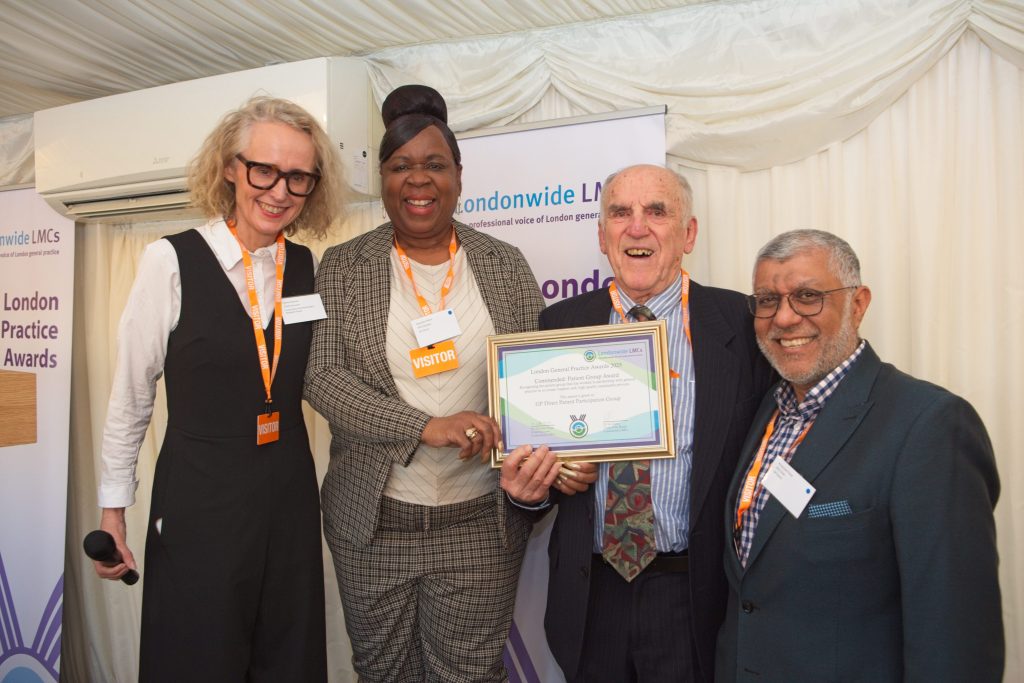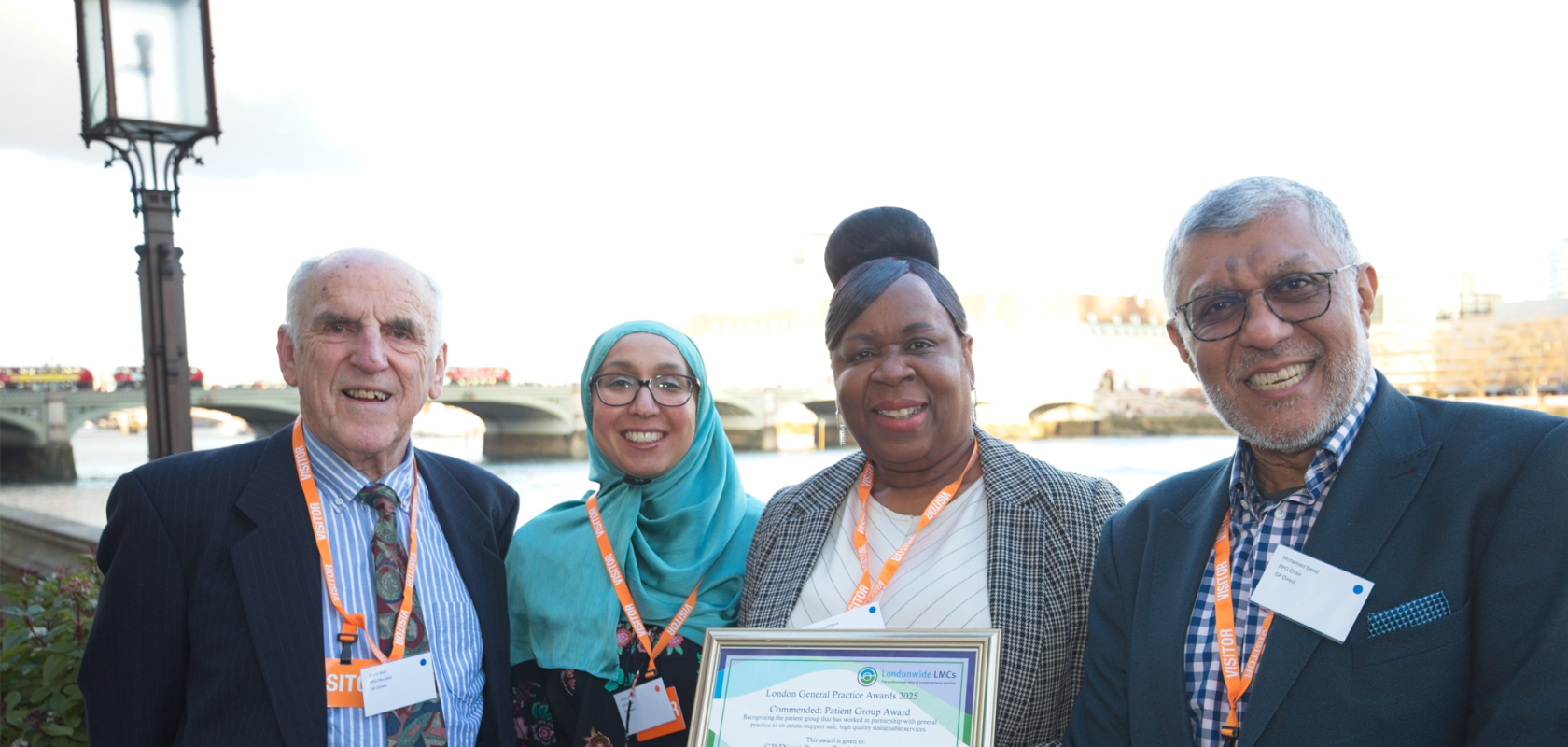This piece was published on Monday 31 May 2025, to mark National Patient Participation Week which starts then.
At the London General Practice Awards on 6 February 2025, GP Direct was commended with the London General Practice Patient Group Award, presented to them by Dianne Barham, Chief Executive of Local Voice and Healthwatch Waltham Forest.
Mohammed Dewji, Chair of the Patient Participation Group (PPG), expressed his delight, “I’ve only been a part of the PPG for under two years, but it’s been fabulous to work with the team. They are brilliant, and everyone brings that passion, energy, and positivity even when it gets challenging,” Mohammed said.
He emphasised the importance of the PPG in creating a supportive community atmosphere. “We’re not going to solve everyone’s problems overnight, but the aim is to really try and create that feeling of community and cohesion that just goes above and beyond. The PPG gives us the opportunity to reach into the community and give the feeling that when you go to your GP practice, it is a lot more than just going to see a doctor when you’re ill or for a prescription. It’s about building that sense of community that whoever the patient is, we all bring value, and we can all help each other.”
 Connecting with the community and tackling inequalities
Connecting with the community and tackling inequalities
GP Direct serves a diverse patient population of approximately 27,000 people. The team consists of 85 staff members, including doctors, clinical pharmacists, physiotherapists, nurse practitioners, practice nurses, healthcare assistants, and phlebotomists. The practice aims to develop the people who work there, for example one of the healthcare assistants is currently training to become a nurse associate.
Samantha Sharkey, the Practice Manager, highlighted the practice’s long-standing commitment to the community. “One of our founding partners, Dr. Merali, has been with us for over 40 years, which underscores our deep roots in Harrow.”
The patient demographic at GP Direct is youthful, with the majority being under the age of 50. “While many smaller local practices have a higher proportion of patients aged 65 and above, our population tends to be younger,” she explained.
Jamila Sherif, the PPG Lead at GP Direct, is keen to emphasise their unique collaborations with the voluntary sector, such as the health fair for children organised last year in partnership with Blossom, a charity dedicated to women, young children, and pregnant women.
“Our practice has a young population with a high rate of pregnancies and lots of children. We’re working to support the needs of young families, as there’s a lack of support and awareness about what’s available for them.”
This year, GP Direct is focusing on the needs of asylum seekers and refugees. Jamila noted the valuable feedback from PPG members who are refugees or have relatives who recently joined the practice. “We aim to provide support that is available locally, social spaces, and events that can benefit them,” she said.
One of the exciting projects in development is the creation of a community garden, envisioned as a green social space. “There’s a lot of evidence in social prescribing and gardening for well-being. We want to launch a community garden where patients who are lonely, feel isolated, or depressed could go,” Jamila added.
Another successful initiative is the Social Space, organised by Beverley Pitter, the PPG admin lead. Running since 24 June 2024, this project offers a hot lunch and social activities such as bingo, board games, crafts, and knitting at a local community centre. Jamila shared positive feedback from patients with complex physical and mental health challenges, who have found the Social Space life changing.
Looking ahead, GP Direct is considering the establishment of a ladies’ walking group, responding to feedback from committee members. “Some of the ladies are widowed, some were carers for their partners, and they wanted to have a female-only space. So, that was interesting to receive that sort of feedback,”
GP Direct say tackling inequality is an important part of their work. To support unemployed people, they partnered with West London Works in December 2024, co-locating their support services with GP surgeries. This presence provides voluntary support for those with physical and mental health conditions to help them gain employment.
GP Direct are no strangers to winning awards, having been recognised as Harrow Heroes by the local council in 2023.
From a patient’s perspective
Mohammed shares his positive experiences with the practice as a regular patient, highlighting the Sunday walking group that encourages patients to become healthier. “It has been long-standing and featured in the local news. I think this encourages well-being and gets patients to think a little bit for themselves apart from taking advice from the doctor because there’s a lot you can do for yourself,” he said.
The PPG at GP Direct was re-established in May 2023 with a focus on broader inclusion across different social groups. Mohammed emphasised the importance of reaching out to individuals whose first language is not English, ensuring they feel included and can access information despite language barriers. “Our team is quite a wide mix of different groups and ethnicities, which is lovely because it means that you get different perspectives on things. What we all have in common is that we try to improve the outcomes and have a better focus on the health of our patients.”
One notable event organised by the PPG last year was a cancer awareness evening, which was well attended and featured presentations from various GPs and experts, followed by a lively Q&A session. “It’s things like that which I think are helpful, going beyond what a traditional GP practice might do and really starting to get that broader inclusion within the community,” Mohammed concluded.
Challenges the practice face
The practice is grappling with space constraints and funding issues. Samantha highlights the daily struggle of clinicians having to work from home due to the lack of clinical space. “We are battling in the background for the funding and extra space, but at the moment, the NHS is kind of in crisis again. There’s no space and there’s no money. So, now, what we struggle with is having only high-risk patients in the practice, and the others as telephone consults. That is our biggest issue, not having enough clinical space.”
“I think the other thing that’s been probably an issue throughout my entire career, is the mental health services. It’s still an area that we struggle to refer patients to safely and effectively. The resources still aren’t there in mental health,” she added.
Jamila has shed light on the complex challenges faced by the practice in delivering comprehensive patient care. She highlighted the limitations of the standard 10-minute GP appointments, particularly when dealing with patients who present multiple problems.
“There is a big issue in Harrow’s housing, with poor-quality rented accommodation, overcrowding, and damp conditions causing mould. This leads to depression and emotional problems,” she explained. “In one consultation, along with the medical aspect, there are also many social issues that everyone is trying to deal with.”
Jamila spoke on the need for additional support services to address these broader issues. “Primary care can’t manage all of that. You need social prescriber services, funding, and collaborations with wider sectors to help with housing issues. A GP’s role is limited, and it can be frustrating. We need agencies or collaborations to support the clinical team in tackling the wider issues.”

